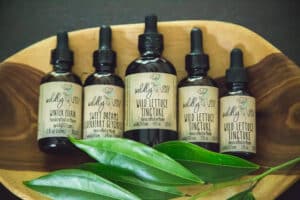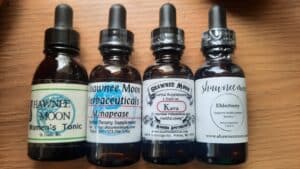Let’s be real. There is bacteria in your gut. But the question is; is it ‘good’ bacteria, or ‘bad’?
If you have bad bacteria in your gut, it is often a form of candida, or simply, yeast. This is a very common cause for intestinal gas, bloating, diarrhea, sugar cravings, weight gain, irritable bowel and more. Once you have a well established bacterial yeast developed in your gut, it can lead to more serious problems.
The yeast that is present in most of our systems, due primarily to diet, feeds on sugar and artificial sweeteners. And it hijacks your intestinal signals to the brain to tell you whether you are actually full or not. This leads to over eating. The yeast then interferes with more signals and quite literally demands more sugar to fuel it’s existence.

This creates a terrible cycle that leads you to over eating all the wrong foods. When your body consumes more sugar than it can process and utilize as energy (approx 2 teaspoons, or 8 grams, of sugar is the max the liver can deal with at one time), it’s only other option is to turn the excess into fat and store it. And then your gut screams for more sugar, and the cycle continues.
Supplying your lower GI tract with ‘good’ bacteria can help counter act this bad bacteria, and promote healthy intestinal flora growth. This healthy bacteria will help digest food quicker, leading to healthier/regular bathroom trips, decreased bloat/gas, increased energy and elevated mood.
Probiotics are usually supplements that contain multiple strains of healthy bacteria that can help improve intestinal flora.
But what should you look for in a quality Probiotic? Here are just three things to consider when choosing a probiotic:
1 – When checking out all the options for probiotics, look for one that has at least 8 strains of healthy bacteria.
2 – Also make sure that each capsule delivers at least 10 billion viable organisms.
3 – Generally, getting one in the refrigerated section of your health food store is a good idea. These are viable organisms that need to be preserved without unnatural preservatives. But there are some high quality ones that do not have to be refrigerated, you just need to do your research
But what about yogurt? Most yogurts are touted to aid your gut and relieve intestinal distress. But how much truth is in this?
Well, unless you are making the yogurt yourself, then there is not much truth to it at all. Dairy products DO have beneficial, naturally occurring bacteria. It can boost your immune system and promote that healthy intestinal flora we’ve been talking about. But unless you are drinking/eating these products in their fresh, raw, form, the benefits are not nearly as effective as you would think. See, most, if not all, of the dairy products you buy at the store have been pasteurized; this process heats the product to a temperature that kills much of the bacteria, though certainly not all. “Unlike sterilization, pasteurization is not intended to kill all micro-organisms (pathenogenic) in the food. Instead, pasteurization aims to achieve a “log reduction” in the number of viable organisms, reducing their number so they are unlikely to cause disease (assuming the pasteurized product is refrigerated and consumed before its expiration date). Commercial scale sterilization of food is not common, because it adversely affects the taste and quality of the product.” [source] Since we know that pasteurization kills a significant number of the good bacteria with the bad, that is present in most dairy products, including yogurt, it is important to realize that you will likely have to consume large amounts of the products to make it worth while. AND, that means that our body’s will have a harder time digesting the products because of the lack of good bacteria; which is one reason for lactose intolerance.
Another reason to avoid store bought yogurt is because they often contain added sugars. If you do enjoy yogurt, which is perfectly fine to do so, be sure that the one you pick does not have added sugars. A serving of dairy should only have about 13 grams of sugar; the average for naturally occurring sugar in milk. Any more is added and will only add to your gut distress.
Can herbs be probiotic?
pro·bi·ot·ic ˌprōbīˈädik/ adjective
If you do a quick Google search of ‘herbal probiotic’ you will find many results. Such as “Peppermint and Olive leaf supposed probiotic effects”. Peppermint has similar results as a probiotic, decreased indigestion, but the way it achieves this result are different. And even Olive leaf is a different property from Peppermint that makes it improve intestinal health. But both Peppermint and Olive leaf herbs are not what I would consider probiotics in and of themselves. They do not just stimulate microorganisms in the gut to grow. [I could be proven wrong on this, but through my research and understanding, that is my opinion at this point]. Unless you fermented your herbal concoction. This would be a substance that has been properly fermented and aged to create many of those high quality probiotic substances. Many foods such as yogurt, sauerkraut, buttermilk and other fermented or pickled vegetables are wonderful sources of natural probiotics. I am not well studied on this topic but I know the book, Nourishing Traditions by Sally Fallon has a wonderfully informative section about fermenting your own drinks and foods for health. You could consider adding some of the following herbs to your own fermented drink for a highly beneficial herbal probiotic health alternative.
Peppermint is a carminative, it helps reduce gas and ease digestive discomfort through the expulsion of said gas. Other herbal carminatives are: fennel, caraway, ginger, catnip, wood betony and chamomile.
Olive leaf has actual anti-fungal and anti-yeast properties. This could help reduce the bad bacteria in the gut, there by reducing inflammation and digestive distress. Other anti-fungal/anti-yeast herbs: tea tree oil, pau díarco, neem leaf, echinacea, garlic, olive leaf, oil of thyme, grapefruit seed oil, chaparral.
Bitters stimulate digestive and pancreatic juices. “Bitters” is kind of an old term. But these herbs that stimulate digestive juices are very helpful in cases of irregularity. A few herbs that are considered bitters: boneset, chicory, feverfew, gentian, hops, wormwood.
A cholagogue is a property that promotes the flow of bile into the small intestine (which is also considered a mild laxative, since the bile will stimulate an increased digesting rate). True laxatives, though, actually stimulate peristaltic movement; in other words, it tells the intestines to contract and ‘push’/’move’ out the fecal matter. Herbs that are considered to be cholagogues: goldenseal, cascara sagrada, licorice root & dandelion.
What experience have you had with probiotics? Do you have any questions? Please add your thoughts below!
_______________________________________________________________________________
The information contained in this post is for educational purposes only; it is not intended to treat, diagnose or cure disease. It is simply for use in the maintenance and promotion of good health in cooperation with a licensed medical practitioner. Kerry Brock and Shawnee Moon are not licensed to treat or diagnose disease. Consult with your physician for diagnosis or treatment. By using this information you agree that the decisions regarding your health are your own responsibility and understand that Kerry Brock and Shawnee Moon are not liable for your health decisions.






3 thoughts on “How to Choose the Best Probiotic and are there Herbal Probiotics?”
Thanks for presenting this article, Kerry. Very good to know about some of the herbal properties (cholagogue is a new one for me).
I’ve begun my fermenting journey (veggies, water kefir) which I hope will provide probiotics for us. Getting the household aboard will be the test…
If essential Oils (EOs) are anti-bacterial, anti-fungal, or anti-microbial in nature, then will they kill the fermented probiotics?
Thank you for your response and question, Lebronfamily6! In my understanding, herbs in all their preparations, [be it fresh, in a tincture, ointment or distilled as an oil, etc.] that have been found to be anti-bacterial/fungal/microbial will only kill the bad bacteria/fungus/microbes not the good. Exactly *how* they do this, I have yet to discover. But I believe God made these plants pretty smart. Just like cayenne peppers are good for balancing a healthy circulatory system; so it can be helpful to both high or low blood pressure. There are also some herbs recommended for both hypothyroidism and hyperthyroidism. The body recognizes the plants as food and uses the nutrients how it needs it best. How it does this, again, I’m not quite sure. There is still so much to learn!
[These statements have not been evaluated by the FDA. It is not intended to diagnose, treat, cure, or prevent any disease.]
Upon a bit more research, it seems that the reason antibacterial, antibiotic herbs and oils can attack the ‘bad’ bacteria yet leave the ‘good’ is the difference of gram positive and gram negative bacteria. They react to the negative bacteria, but identify with the positive and do not bother it.
[These statements have not been evaluated by the FDA. It is not intended to diagnose, treat, cure, or prevent any disease.]